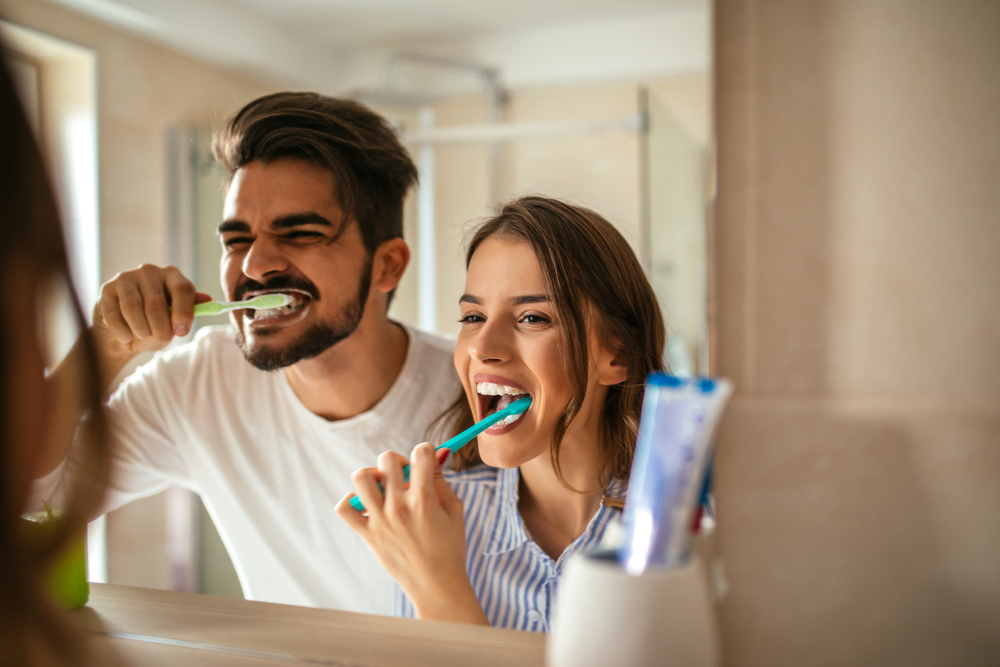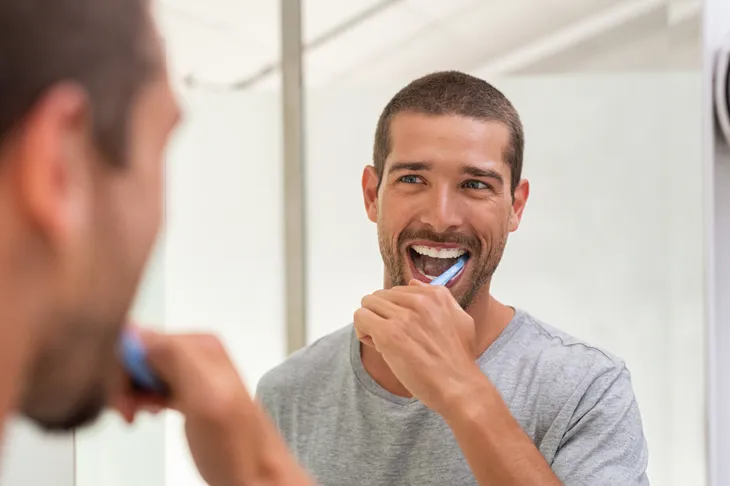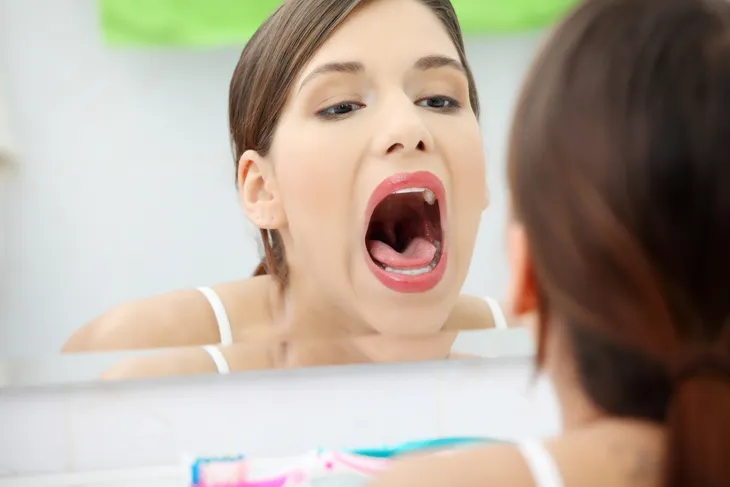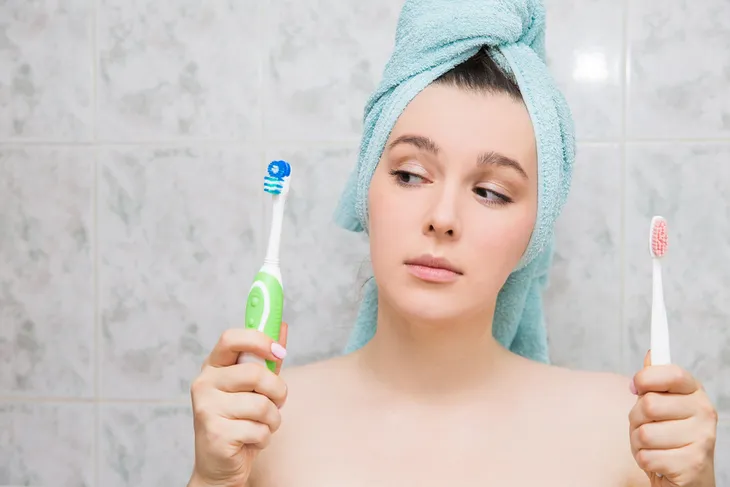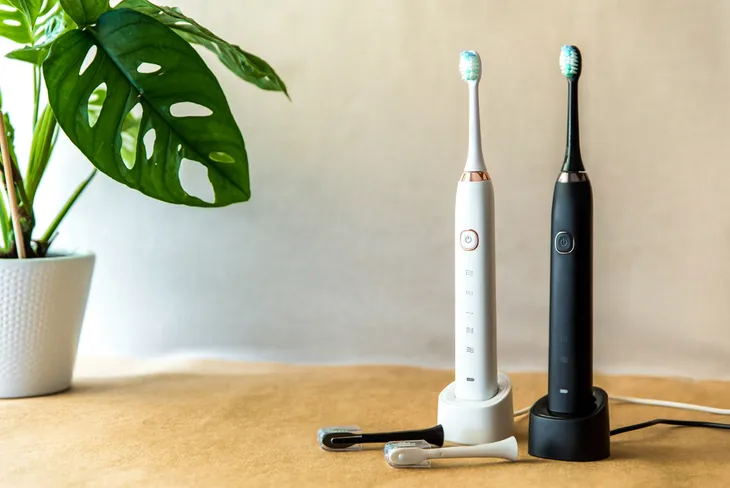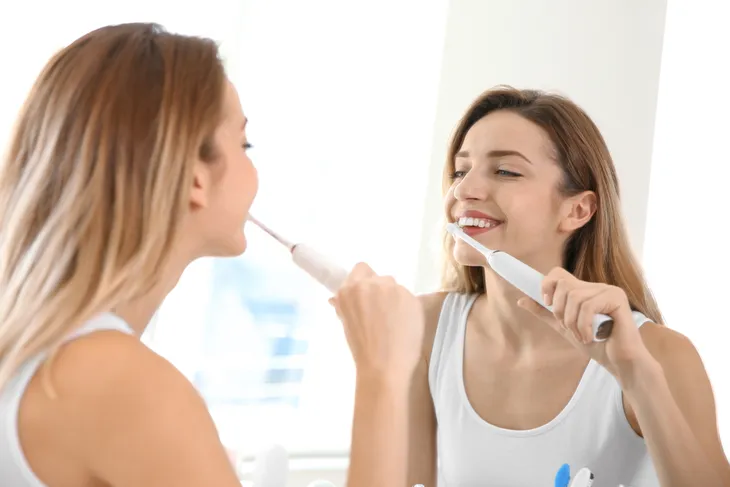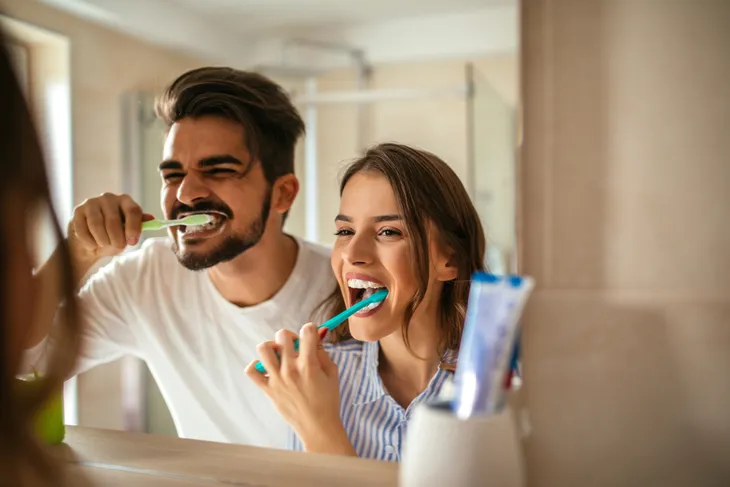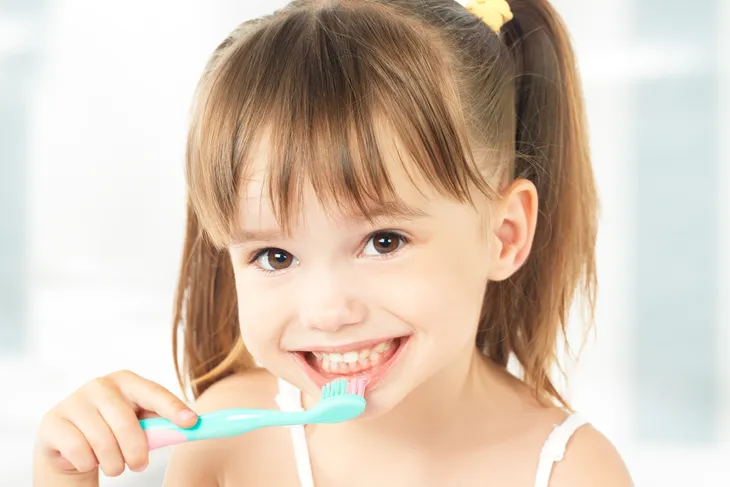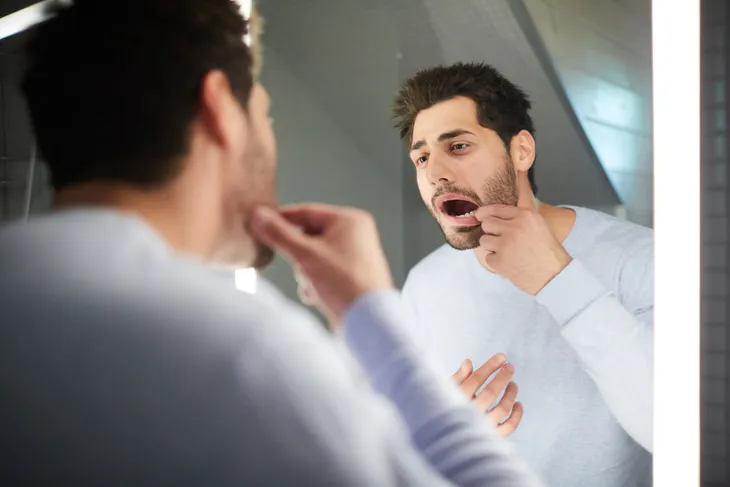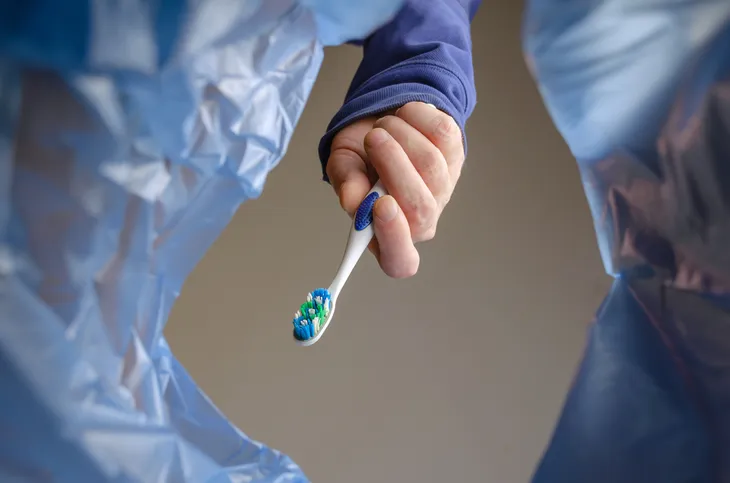We (hopefully) all learn how to brush our teeth from a young age. We probably also get some instruction from a dentist/parent about how to properly brush our teeth – which, according to MouthHealthy.org, is actually by placing the brush at a 45-degree angle at the gums and using gentle strokes over the length of the tooth.
However, while we may have learned proper frequency (twice a day will do it) and technique, many may not know much about which toothbrush to go with — and there are quite a few choices out there including electric or manual. So, how do you know which one is best for you or your child? Read on to brush up on your knowledge…
Why Choosing the Right Toothbrush Is Important
You should just be able to buy any adult/child brush off the shelf and have it do the job, right? Not exactly, says The Vital Record (a publication of Texas A&M Health). That’s because choosing the wrong brush for your pearly whites might do “more harm than good,” says the source.
An incorrect brush for the person using it can lead to gum recession and “other health hazards.” Not properly tending to your teeth (with the right brush) can lead to poor oral hygiene, which has been linked to other health problems.
How Big Should the Brush Be?
As you grow, your mouth changes — and so then should your brush. Choose a brush that allows you to easily access all of your teeth, including the back of the molars out of view. WebMD suggests that adults should be looking for a toothbrush head that’s about 1-inch tall and 0.5-inches wide for the highest effectiveness.
Bigger is not always better when it comes to brush size, adds the source. A brush head that is too big will make it more difficult to maneuver into the tight spaces where food residue could be hiding. As far as the handle is concerned, it should be just long enough to comfortably fit in your hand.
Should I Choose Soft or Hard Bristles?
There’s a bit of a misconception out there that harder/firmer bristles mean a more thorough cleaning. However, while there are soft, medium, and hard bristles available on the market, experts seem to agree that soft nylon bristles are the way to go. This applies to both manual and electric toothbrushes.
This is because soft bristles are much less likely to do damage if you get carried away during the brushing process. The Vital Record says more matter-of-factly: “Soft and rounded bristles are gentle on your teeth and gums, unlike hard and rough bristles that can stress your gums, which can lead to gum recession.”
What’s the Deal With Rounded Bristles?
Wait, there are rounded bristles too? Rounded vs. straight bristles is another decision you’ll face when shopping for a new toothbrush, and it’s an important one. However, it might be confusing what the industry means when it refers to “round” bristles because there are so many configurations of bristles available.
Patient Connect explains that in this case, the bristles have actually been “end-rounded” (smoothed) to avoid gum damage. The source also points to an article on Dentistry Today that explains rounded bristles have had the burrs removed from the bristle trimming process, which makes them less abrasive.
Should I Get a Toothbrush With a Tongue Scraper?
Your tongue can also harbor bacteria, and for a long time, people have used tongue scrapers to remove biofilm on the tongue and improve their breath in the process. A study looked at the effectiveness of a newer toothbrush design that includes a tongue scraper on the back of the head, as opposed to a traditional standalone scraper.
The results were positive for the toothbrush add-on. “No statistically significant differences … were found between the toothbrush’s tongue scraper and the commercial tongue scraper, regarding their effectiveness in improving breath odor,” notes the article. Not only does a tongue scraper help improve breath, but it can also destroy the bacteria that can lead to other oral issues including decay.
Which Is Best: Electric or Manual?
This was an easy decision before electric toothbrushes came into the scene in the U.S. in the late 1950s. Obviously, the concept caught on, as there are many great models of electric rechargeable toothbrushes available on the market today.
While there are pros and cons for both types, WebMD assures that if you follow the proper brushing techniques and schedule, you should be able to keep plaque at bay regardless if you go electric or manual. It could come down to “likability,” says the source. In other words, the one you’re more likely to use well (and perhaps even enjoy doing so).
The Cons of Electric Toothbrushes
When it comes to rechargeable toothbrushes, they have some wins and some losses against their more-traditional counterparts. One of the downfalls of electric toothbrushes is price. “Electric toothbrushes cost many times more than manual toothbrushes,” notes WebMD. There’s also the fact that you will need to replace the brush head on an electric unit every few months or so.
WebMD also says there are studies to suggest electric toothbrushes may “increase the amount of bacteria in the bloodstream more than a manual toothbrush.” If you have a heart condition, this could pose a health risk – but more research is needed on this topic, it adds.
The Pros of Electric Toothbrushes
In contrast, an electric toothbrush may deliver more even pressure compared to a manual brush, as some people use the latter too vigorously. It could also be a better choice for people who have limited mobility or conditions such as arthritis that makes manual agitation difficult.
Further, some electric models have a timer to let you know when you can stop. One more biggie — WebMD says there’s evidence to suggest an electric “rotation oscillation toothbrush” is actually more effective than a manual (and apparently some powered models too).
The Pros and Cons of Manual Toothbrushes
One obvious plus of a manual toothbrush is that you don’t have to worry about charging it between uses but that also means it won’t do any of the work for you! Manual toothbrushes range in price but are typically much cheaper than an electric model, which is important if budget is a major factor.
However, there’s the aforementioned risk of using a manual toothbrush too vigorously. It may seem like it makes sense to brush harder to scrub away all the bad stuff, but Everyday Health says this can contribute to gum and tooth damage. It’s also sometimes tough to pace yourself when using a manual brush, which sometimes leads to brushing too hard to get finished quicker, notes the source.
Getting the Right Toothbrush For a Child
Okay, you now know all the things to know about choosing an adult toothbrush. But what about for a child? There are both disposable (manual) and electric toothbrush options for the younger crowd too. Some manufacturers try to wow kids with graphics from their favorite TV shows or movies, but that doesn’t mean they’re the best choice. WebMD says there are a few important points to keep in mind when it comes to buying a brush for your young ones.
It should be properly sized, to be handled easily by a child. It should also have soft bristles, and it also should have an ADA seal of approval (which is a good idea for any brush you buy). The source suggests letting your kids pick out their own when they get a bit older (as long as it meets the criteria) to get them more excited about oral hygiene. On that note, some kids’ toothbrushes play music or flash lights to measure the right amount of time to brush for, which can be helpful, but not crucial.
Signs You’re Using the Wrong Toothbrush
There are some telltale signs that your current brush is not a good match for you. If you’re choosing bristles that are too hard, then you might notice some recession of the gums that exposes more of your teeth. If you notice any grooves in the sides of your teeth (also called toothbrush abrasion), it could be a sign that you’re brushing too hard. If this occurs, you might want to consider an electric brush instead for more consistent pressure.
Also, using the wrong size can ultimately leave your mouth as a wide-open target for bacteria that causes gum disease, because you might not be able to reach some of the areas effectively. If this is the case, consider using a slightly smaller toothbrush head to get into those hard-to-reach spaces. Meanwhile, if there are obvious signs of wear on your brush, it’s time to ditch it.
When to Change Your Toothbrush
Most expert recommendations say to swap out your brush every 3 to 4-months (or earlier). According to Healthline, the optimal lifespan of a standard toothbrush is actually about 40-days. At least that’s what a study found, which suggests the bristles start to flare at that point after consistent use. This flaring makes the brush less effective for removing plaque.
But the wear is not just from repeated contact with teeth. The source notes that the nylon bristles are weakened over time by water and chemicals in the toothpaste. Meanwhile, the same source also says you should change the head of your electric toothbrush every 12-weeks (about 3-months) or earlier if there are visible signs of wear.
